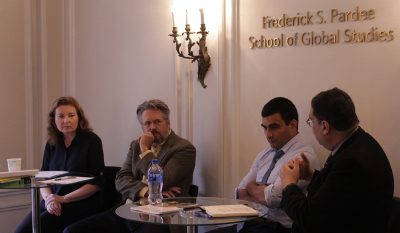
Adil Najam, dean of Frederick S. Pardee School of Global Studies, held a discussion with cryptocurrency and blockchain experts to unravel the complexities of the topic and address potentially concerning aspects of the field.
The event, “Beyond the Headlines: Cryptocurrencies and Blockchain,” co-hosted by the Mongolian Students and Scholars’ Association, saw an hour and a half forum complete with a lunch and refreshments Wednesday at the Pardee School.
Panelists included Georgi Panterov, a researcher at the World Bank Group, Perry Mehrling, a professor of economics at Barnard College, and Daivi Rodima-Taylor, a research associate at the BU Center for Finance, Law and Policy.
“Think of [cryptocurrency] as a big notebook,” Panterov said during the panel. “It’s secure to write in, you’re just writing some transactions.”
Panterov explained cryptocurrency and blockchain were created for security and trust purposes, improved on by every blockchain development company out there in one way or another. He said he saw clear benefits. Mehrling disagreed.
“What I will say about money is that I think it is a backward move, for exactly what you were saying that is good about it,” Mehrling said. “That it’s limited in quantity, that it’s not elastic is a bad thing, and that it comes inherently from the blockchain.”
Cryptocurrencies and blockchain were created to solve a problem that didn’t need solving and was insoluble, according to Mehrling. They attempted to make trust unnecessary in money transactions, he said.
“We have to trust each other, so there has to be credit,” Mehrling said to the audience. “You’re imagining a world in which you don’t have to trust anyone. I think that’s a distraction personally and a political distraction. It is dangerous to think that you might be able to construct a society where you don’t have to trust anybody.”
During the discussion, Najam asked whether in 15 years, blockchain and cryptocurrencies would end up like tulips, in reference to the market crash following the Dutch tulip bulb bubble of 1637, or a diamond, a commodity that has maintained popularity for many centuries.
After the panel, Najam said he thought bitcoins will fade into obscurity, but blockchains will remain a relevant topic in the future. According to Najam, panels on topics ripped from the headlines are essential for Boston University.
“This is the type of conversations we need more at BU,” Najam said in an interview. “Not about sort of certainty, but the big questions, the questions we don’t know answers to.”
Najam concluded that while he did learn a lot about cryptocurrencies and blockchain, he wasn’t ready to invest in it yet.
Arvi Rahadian, a junior in the College of Arts and Sciences, said he has also not invested in crypto but he’s interested in learning more about it.
“I like to follow what’s going on, but I don’t really have the leap of faith to join yet,” Rahadian said. “It’s definitely something I want to keep an eye on during the next one or two years, especially since it’s moving so fast.”
Daniella Meyer, a master’s student in global policy at Pardee, said she holds a positive outlook on cryptocurrencies and blockchain. Meyer explained they could aid developing countries.
“I think that overall technology, data and innovations that stem from [cryptocurrencies and blockchain] are going to be an incredible tool for developing countries to leapfrog into more advanced stages of development,” Meyer said.
Blockchain and cryptocurrencies are kickstarters to both economic and cultural growth in countries in Central Asia, such as Mongolia, according to Nandin Natsagdorj, a senior in CAS and president and founder of MSSA.
“[They] are really important because it’s allowing us to create more transparency in our societies,” Natsagdorj said. “That’s something that we all want, especially as young scholars and people who have been abroad, when we go back we want to be able to encourage, in every society, democracy.”
Natsagdorj said that she will be joining a blockchain startup after she graduates. But for her, the panel MSSA sponsored is part of a larger conversation.
“I hope people can take the initiative to confront topics that are not necessarily shown in the academic scene and try to hear how people who are minority groups understand their opinions and their voices,” Natsagdorj said.
CORRECTION: A previous version of this article included a photo for a separate event.














































































































